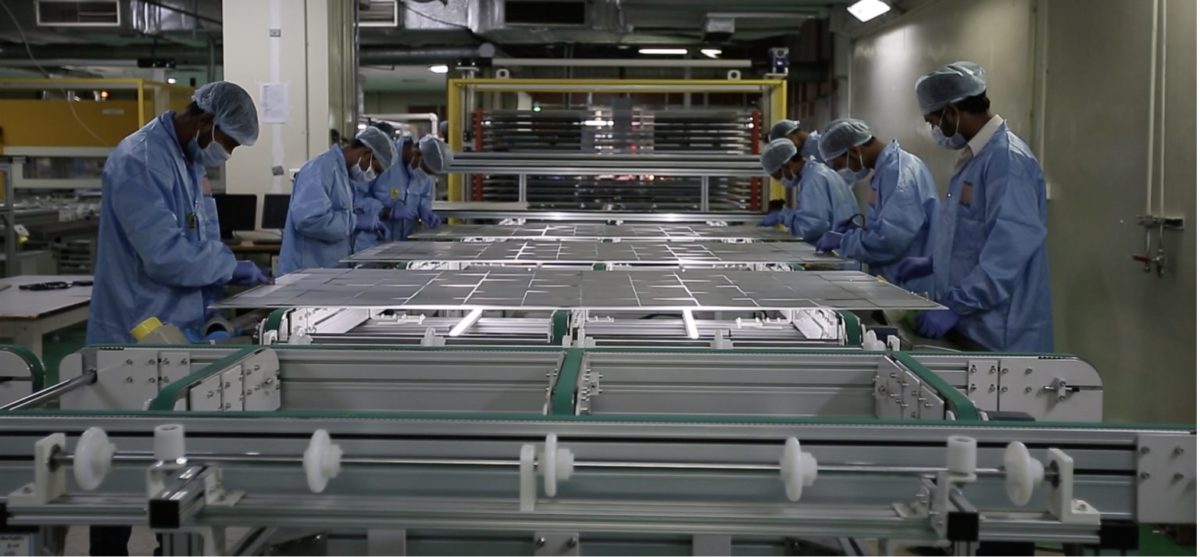From pv magazine India
Indian solar manufacturers will continue to see strong demand for their modules aided by several policy measures over the medium term. However, it needs to be seen whether they will be able to meet all of this demand from the utility and non-utility segment, according to ICRA Ratings, which adds that quality of these modules also remains monitorable.
Responding to government policies aimed at creating demand for domestic modules, many of the domestic OEMs have announced sizeable capital expenditure to augment their cell and module capacity. This includes the capex for integrated facilities under the PLI scheme by the winning bidders; the recent increase in the PLI scheme outlay for solar modules — to INR 240 billion ($3.22 billion) from INR 45 billion ($600 million) earlier — is expected to support the setting up of additional cell and module manufacturing capacity of up to 40 GW.
Speaking about policy support, Girishkumar Kadam, ICRA senior vice president and co-group head of corporate rating, said, “The policy focus by the Government of India (GoI) in the renewable energy (RE) sector remains strong as also evident from the policy target of 500 GW of non-fossil fuel-based capacity by CY 2030 as well as policy direction in the energy transition with net-zero emission target by 2070. In this context, capacity addition in solar energy segment within the RE is expected to remain significant with about 65-70% share by FY 2030, given the relatively lower execution challenges in the solar segment.”
“Further, the GoI has a solid policy focus to encourage the domestic manufacturing for photovoltaic (PV) modules through various policy measures announced in last two-three year period, such as notification of approved list of module manufacturers (ALMM) w.e.f. April 2021, imposition of basic customs duty (BCD) on imported cells and modules w.e.f. April 2022, award of manufacturing-linked PPAs for an aggregate capacity of 12 GW, ongoing implementation of production linked incentive (PLI) scheme as well as that of various central schemes announced earlier, requiring the use of domestic modules. Further, ALMM list has only domestic solar OEMs and there remains an uncertainty for inclusion of foreign solar OEMs as of now.”
However, timely commissioning and ramp-up of on-going capex in module manufacturing value chain remains critical in the near to medium term as domestic manufacturers relying on imported cells remain exposed to price fluctuations.
PV module prices have remained elevated over the last 10 to 12 months, owing to polysilicon demand-supply imbalances as well as supply chain disruptions in China. Given that the import dependency for the OEMs is expected to continue for sourcing of key components, the pricing behavior for polysilicon and cells in China thus remains a key monitorable, going forward.
Commenting further, Vikram V., ICRA vice president and sector head of corporate ratings, said, “OEMs based on imported cells remain exposed to volatility in cell/module price levels. Based on an imported module price level of 27 cents/watt for mono PERC modules and cell price at 15 cents/watt, the cost of modules from such domestic OEMs is expected to be lower by 10-11% post-April 2022, assuming the applicable BCD on imported cells/modules. However, the extent of discount will reduce, if the prices of imported cells and modules reduce from the prevailing level.”
For OEMs having integrated facilities, the scale of operations, the pace of technology adoption with the emerging trends in key markets such as in China and Europe as well as module price movement remain critical factors to ensure viability, he added.
This content is protected by copyright and may not be reused. If you want to cooperate with us and would like to reuse some of our content, please contact: editors@pv-magazine.com.




1 comment
By submitting this form you agree to pv magazine using your data for the purposes of publishing your comment.
Your personal data will only be disclosed or otherwise transmitted to third parties for the purposes of spam filtering or if this is necessary for technical maintenance of the website. Any other transfer to third parties will not take place unless this is justified on the basis of applicable data protection regulations or if pv magazine is legally obliged to do so.
You may revoke this consent at any time with effect for the future, in which case your personal data will be deleted immediately. Otherwise, your data will be deleted if pv magazine has processed your request or the purpose of data storage is fulfilled.
Further information on data privacy can be found in our Data Protection Policy.